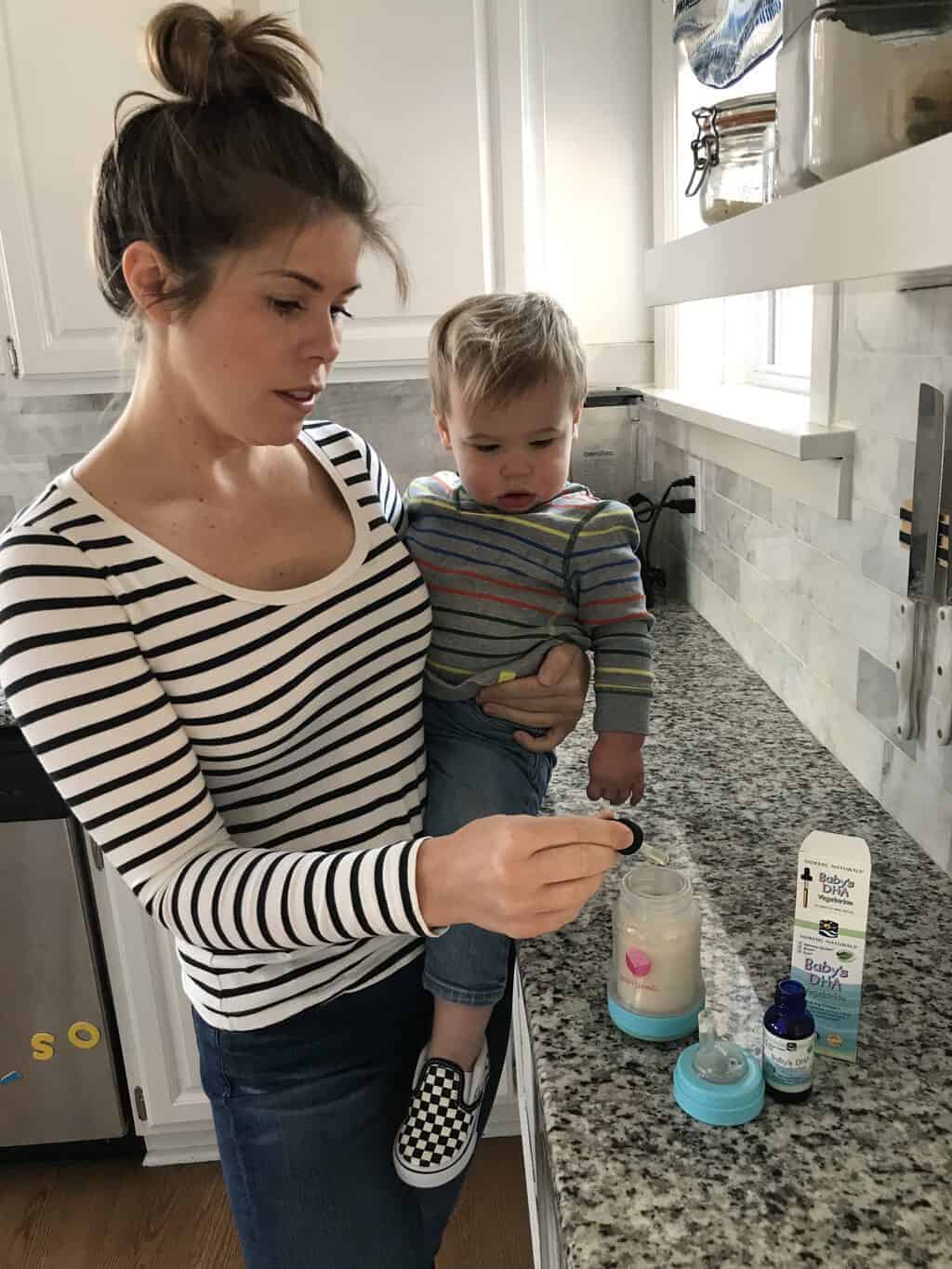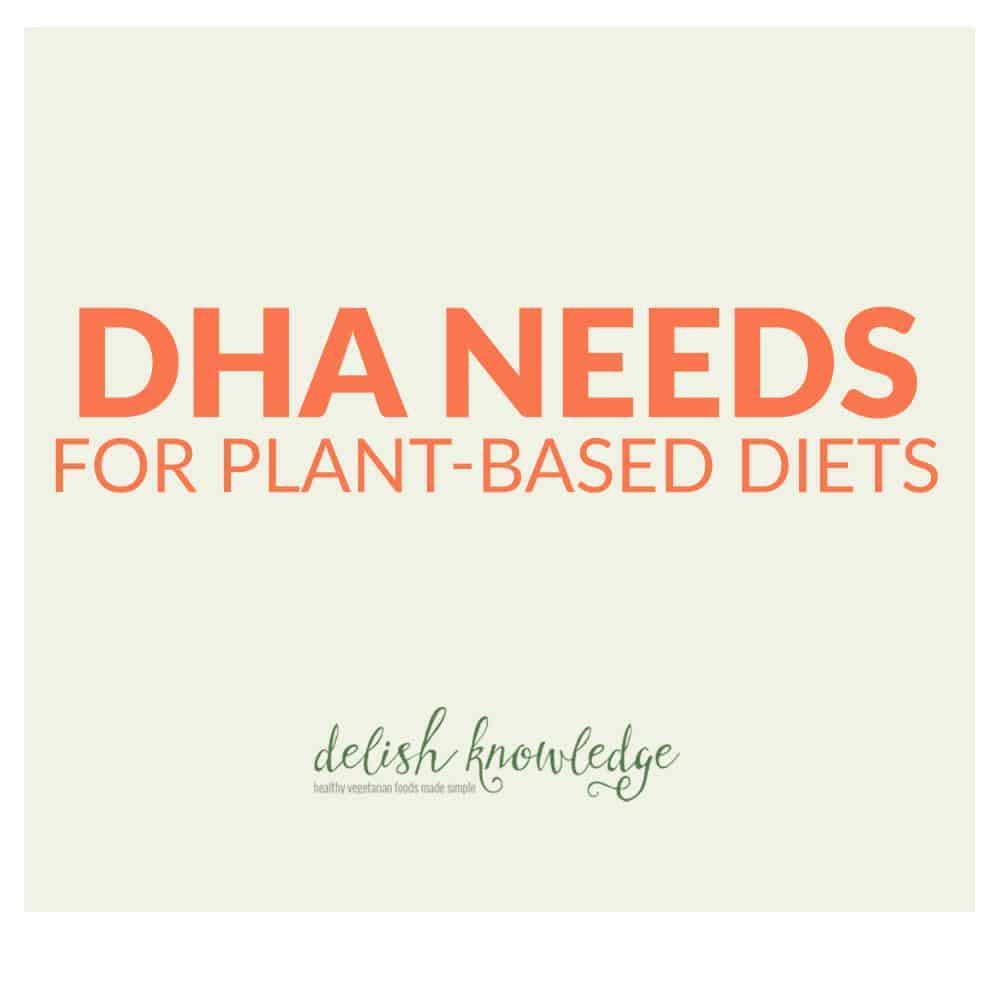DHA Needs for Plant-Based Diets
DHA needs for plant-based diets. A dietitian answers all of your DHA nutrition questions. Including: what omega 3 fatty-acids are, where to find them, why you need them in your diet, recommendations for pregnant women, and supplement guidelines.
DHA Needs for Plant-Based Diets
Omega-3 fatty acids are considered essential fatty acids. This means they’re necessary for health and our bodies cannot make them. We have to get them through food or supplements.
Having enough omega-3 fatty acids in the diet is critical for brain function, lowering harmful lipid levels (LDL “bad” cholesterol and triglycerides), and reducing the inflammatory response in the arteries.* In basic terms, we need them and most of us aren’t getting enough.
When we hear the term “omega-3 fatty acids”, we tend to think of fatty fish (mackerel, salmon, tuna, sardines). While these fish are all excellent sources of omega-3s, many people don’t eat fish. This may be for environmental, ethical, economical reasons or taste preferences.
Types of Omega-3 Fatty Acids
EPA & DHA
EPA (eicosapentaenoic acid) and DHA (docosahexaenoic acid) are two closely-related fats. They’re typically found in fatty fish, and to a lesser extent in some sea vegetables.
While we can technically synthesize these fats from ALA (alpha-linoleic acid), the conversion rate is poor in adults. It’s also very minimal in pregnancy and lactation.
Studies show eating these fats reduces risk of dementia, depression and heart disease. I recommend plant-based EPA and DHA sources derived from algae.
Sources
Flaxseeds, walnuts and a handful of other plants provide ALA.
Whatever side of the vegetarian fence you are on, ALA is important. Some of the best sources are flaxseed and flax oil, chia seeds, hempseed oil, walnuts or walnut oil, canola oil, and full-fat soy foods.
Bottom Line
The two types of omega-3 fats are not interchangeable. Even if you are taking a supplement with DHA and EPA, you still may benefit from a source of ALA (like flax or chia seeds). Even with a good source of ALA in your diet, you still need a DHA and EPA supplement. This is especially true for those with a higher risk of heart disease.
DHA Needs During Pregnancy
Most of us are familiar with the common nutrition recommendations during pregnancy. Get enough folate, take a prenatal, eat a little extra. However, not everyone is as familiar with DHA for moms-to-be.
DHA is critical to support the proper development of baby’s brain, eyes and nervous system.* Additionally, omega-3 intake during pregnancy helps support a healthy postpartum mood.*
DHA accumulation ramps up during the third trimester and continues throughout the first two years of life. It’s why the American Pregnancy Association recommends that all pregnant and breastfeeding women supplement with DHA, regardless of diet.
Plant-based moms have been shown to have lower levels of DHA in umbilical blood and breast milk. Only preformed DHA can raise the level of DHA in mom’s bloodstream, and therefore reach the fetus or baby through breast milk. This means that even a diet high in ALA will not support recommended DHA levels.

DHA supplement guidelines
I highly recommend DHA supplementation for most adults, but especially for plant-based pregnant, lactating moms, and infants. As discussed above, this period of growth is a critical time for brain and eye development and the research around the benefits of DHA is very strong.
Therefore, I don’t see any reason not to supplement with a plant-based source of DHA.
Algae oil is a reliable, plant-based source of preformed DHA. In fact, microalgae is actually where fish get their DHA from in the first place, so supplementing with it cuts out the middleman!
Recommended brand
Nordic Naturals is my favorite brand for vegan DHA as they provide options for adults, pregnant women, and infants. Nordic Naturals is also the official omega-3 supplement of the American Pregnancy Association.
For one, their algae oil is produced using a 100% hexane-free process, which means that DHA is extracted using natural enzymes instead of chemicals.
For adults, I recommend their Algae Omega product, which provides 715 mg total omega-3s, for a higher daily dose than comparable vegetarian options. It’s made with sustainably-sourced microalgae and is certified 100% vegetarian by the American Vegetarian Association.
This is the product that both my husband and I use (when I’m not pregnant/breastfeeding). For pregnant and breastfeeding women, they also have a Prenatal DHA. Like their other vegan products, the prenatal uses sustainable microalgae and is recommended for preconception, pregnancy, and lactation.
What about for babies?
Lastly, while this conversation is largely focused on adults and pregnancy, I want to mention Baby’s DHA Vegetarian.
If you follow me over on Plant-Based Juniors, you know that I’m a broken record when it comes to DHA supplementation for infants. I’ve been giving these DHA drops to Van since 6 months.
Baby’s DHA Vegetarian is a pure, safe, and certified vegetarian source of omega-3 DHA and recommended for babies 5-35 lbs. It’s also certified by the American Vegetarian Association and the official vegetarian baby’s DHA of the American Pregnancy Association.
Tell me: What questions do you have? Did anything surprise you about DHA needs for plant-based diets? Are you currently taking DHA supplements?
* These statements have not been evaluated by the Food and Drug Administration. This product is not intended to diagnose, treat, cure or prevent any disease.


